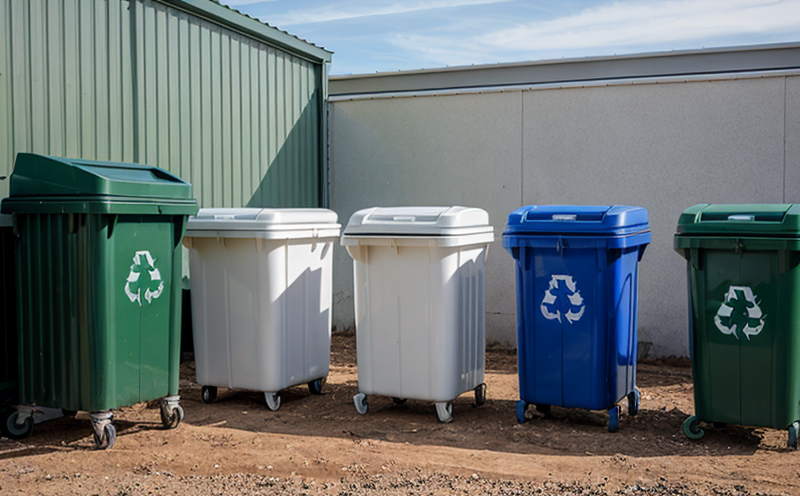EN 16575 Biodegradation in Compost Test
The EN 16575 biodegradation in compost test is a critical procedure used to assess the environmental friendliness of packaging materials intended for composting. This standard is part of Europe's broader initiative to promote sustainable waste management practices, particularly within the context of organic recycling and circular economy principles.
The objective of this test is to determine whether a material can biodegrade in an industrial composting environment under specific conditions. Compliance with EN 16575 ensures that packaging materials are capable of decomposing into natural elements without leaving harmful residues behind, thereby supporting the goals of sustainable waste management and recycling.
The process involves subjecting samples to controlled environmental conditions designed to mimic those found in industrial compost facilities. These conditions include elevated temperatures, humidity, and microbial activity levels typical of such environments. The test evaluates how quickly and completely a material breaks down into carbon dioxide (CO2), water, and biomass during this period.
Testing is performed over a specified duration, usually 90 days or more depending on the specific requirements set by regulatory bodies like the European Committee for Standardization (CEN). During this time, scientists monitor changes in the sample's mass loss, chemical composition analysis through spectroscopy techniques, and visual assessments of decomposition.
Accurate measurement of these parameters helps ensure that only truly biodegradable materials pass the test. Non-compliant products may not meet environmental standards necessary for certification as compostable packaging under EU directives or similar regulations globally.
In addition to its role in ensuring compliance with environmental legislation, EN 16575 also plays an important part in R&D efforts aimed at developing innovative biodegradable materials suitable for single-use applications within the packaging industry. By providing reliable data on material performance during composting processes, this test aids manufacturers in optimizing their formulations while minimizing potential impacts on ecosystems.
Understanding the complexities involved in this testing procedure is crucial for anyone working with sustainable packaging solutions. It highlights the importance of selecting appropriate methodologies tailored not only to meet regulatory expectations but also to support broader sustainability objectives within industries reliant upon effective waste reduction strategies.
Why It Matters
The EN 16575 biodegradation in compost test is essential because it ensures that packaging materials intended for industrial composting do not persist in the environment as persistent pollutants. By verifying whether these materials break down into harmless components under controlled conditions, this test supports efforts to reduce landfill waste and enhance recycling processes.
Composting provides a viable alternative to traditional landfill disposal methods by converting organic waste into valuable soil amendments rich in nutrients beneficial for plant growth. However, only those packaging items designed specifically for composting should be included in such systems; otherwise, they could contaminate the compost heap with non-degradable residues.
Enforcing compliance with EN 16575 helps protect natural environments from unnecessary contamination while promoting responsible resource utilization throughout supply chains. This standard ensures that only genuinely biodegradable materials enter industrial composting facilities, thus contributing positively to global sustainability goals.
Moreover, passing this test can enhance a company's reputation by demonstrating commitment to reducing its carbon footprint and promoting eco-friendly practices across various sectors including consumer goods, food packaging, and agricultural supplies. Such credentials are increasingly sought after in an era where consumers demand more sustainable products from brands they trust.
Benefits
- Enhanced Environmental Compliance: Ensures that packaging materials comply with international standards for compostable waste management, facilitating easier regulatory approvals and certifications.
- Improved Brand Image: Establishes a positive image among environmentally conscious consumers by showcasing dedication to sustainability initiatives.
- Promoted Circular Economy: Supports the transition towards resource-efficient production methods that align with broader circular economy principles.
- Increased Market Opportunities: Opens doors for new business collaborations and partnerships within growing markets focused on sustainable practices.
In addition to these tangible advantages, successful completion of the EN 16575 test can lead to enhanced brand reputation, increased customer loyalty, and improved operational efficiency. These factors collectively contribute significantly toward achieving long-term sustainability goals for companies operating in diverse industries ranging from consumer goods to food packaging.
Industry Applications
| Application Area | Description |
|---|---|
| Agricultural Supplies | Evaluating the biodegradability of mulch films and other agricultural packaging materials. |
| Consumer Goods | Testing packaging for personal care products, cosmetics, and household cleaning supplies to ensure they decompose safely in composting facilities. |
| Food Packaging | Assessing the compostability of packaging used for fresh produce, meat, dairy products, or prepared foods. |
| Aerospace & Defense | Evaluating protective packaging materials used in space missions and military operations to ensure they decompose harmlessly upon return to Earth. |
The EN 16575 biodegradation in compost test is applicable across multiple sectors including agriculture, consumer goods, food packaging, aerospace, and defense. It plays a pivotal role in ensuring that materials used in these industries are safe for industrial composting processes while minimizing environmental impact.





